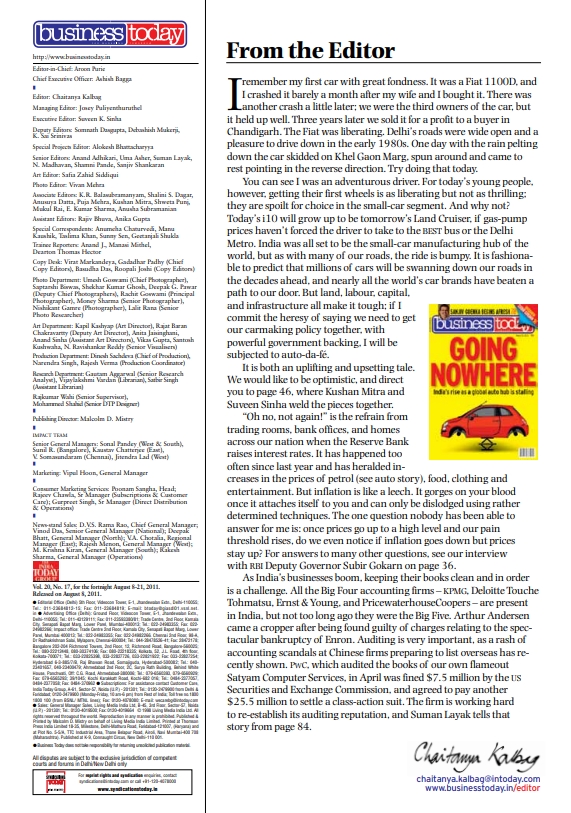Going Nowhere
[Business Today]
Published date: 21st Aug 2011
I remember my first car with great fondness. It was a Fiat 1100D, and I crashed it barely a month after my wife and I bought it. There was another crash a little later; we were the third owners of the car, but it held up well. Three years later we sold it for a profit to a buyer in Chandigarh. The Fiat was liberating. Delhi’s roads were wide open and a pleasure to drive down in the early 1980s. One day with the rain pelting down the car skidded on Khel Gaon Marg, spun around and came to rest pointing in the reverse direction. Try doing that today.
You can see I was an adventurous driver. For today’s young people. however, getting their first wheels is as liberating but not as thrilling: they are spoilt for choice in the small-car segment. And why not? Today’s i10 will grow up to be tomorrow’s Land Cruiser, if gas-pump prices haven’t forced the driver to take to the BEST bus or the Delhi Metro. India was all set to be the small-car manufacturing hub of the world, but as with many of our roads, the ride is bumpy. It is fashionable to predict that millions of cars will be swanning down our roads in the decades ahead, and nearly all the world’s car brands have beaten a path to our door. But land, labour, capital, and infrastructure all make it tough: if I commit the heresy of saying we need to get our carmaking policy together, with powerful government backing, I will be subjected to auto-da-fé.
It is both an uplifting and upsetting tale. We would like to be optimistic, and direct you to page 46, where Kushan Mitra and Suveen Sinha weld the pieces together.
“Oh no, not again!” is the refrain from trading rooms, bank offices, and homes across our nation when the Reserve Bank raises interest rates. It has happened too often since last year and has heralded increases in the prices of petrol (see auto story), food, clothing and entertainment. But inflation is like a leech. It gorges on your blood once it attaches itself to you and can only be dislodged using rather determined techniques. The one question nobody has been able to answer for me is: once prices go up to a high level and our pain threshold rises, do we even notice if inflation goes down but prices stay up? For answers to many other questions, see our interview with RBI Deputy Governor Subir Gokarn on page 36.
As India’s businesses boom, keeping their books clean and in order is a challenge. All the Big Four accounting firms-KPMG, Deloitte Touche Tohmatsu, Ernst & Young, and PricewaterhouseCoopers – are present in India, but not too long ago they were the Big Five. Arthur Andersen came a cropper after being found guilty of charges relating to the spectacular bankruptcy of Enron. Auditing is very important, as a rash of accounting scandals at Chinese firms preparing to list overseas has recently shown. PwC, which audited the books of our own flameout Satyam Computer Services, in April was fined $7.5 million by the US Securities and Exchange Commission, and agreed to pay another $25.5 million to settle a class-action suit. The firm is working hard to re-establish its auditing reputation, and Suman Layak tells that story from page 84.






